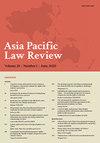Punitive damages under the new Chinese Civil Code – a critical and comparative analysis
IF 1.7
4区 社会学
Q2 LAW
引用次数: 1
Abstract
ABSTRACT Punitive damages have their roots in the common law system. Recently, punitive damages have been increasingly discussed also in non-common law jurisdictions. This Article scrutinizes whether it is viable for a jurisdiction with a civilian legal system to adopt punitive damages in the realm of tort law. It is argued that societal development has brought unprecedented challenges to tort law where merely compensatory damages can no longer provide sufficient remedies to victims. We conduct research mainly from the perspective of China, which has been very progressive in introducing punitive damages into various areas of private law in the past decades and recently codified it in its new Chinese Civil Code. The discussion of Chinese law is proceeded with a comparison with the German law, which is also a civilian legal system that used to have a great influence on the making of Chinese law. We find that the German private law put much emphasis on disgorgement damages, while the Chinese legislator put his trust in punitive damages. German disgorgement damages and Chinese punitive damages focus both on the avoidance of efficient breaches of ubiquitous individual legal rights, such as personality rights or intellectual property rights, but the Chinese legislator makes punitive damages also available in several other legal situations. We provide recommendations for the future implementation of the Chinese punitive damages law in order to maintain a balance between efficient protection for claimants and sanctions on wrongdoers.新中国民法典下的惩罚性赔偿——一个批判性与比较分析
惩罚性赔偿起源于英美法系。最近,惩罚性赔偿在非普通法管辖区也得到了越来越多的讨论。本条审查了民事法律体系的管辖区在侵权法领域采用惩罚性赔偿是否可行。有人认为,社会发展给侵权法带来了前所未有的挑战,在侵权法中,仅仅是补偿性损害已经无法为受害者提供足够的补救。我们主要从中国的角度进行研究,在过去几十年里,中国在将惩罚性赔偿引入私法的各个领域方面非常进步,最近将其写入了新的《中国民法典》。对中国法律的讨论是通过与德国法律的比较来进行的。德国法律也是一种民事法律制度,曾对中国法律制定产生过重大影响。我们发现,德国私法非常重视返还性损害赔偿,而中国立法者则信任惩罚性损害赔偿。德国的吐出损害赔偿和中国的惩罚性损害赔偿都侧重于避免有效侵犯普遍存在的个人合法权利,如人格权或知识产权,但中国立法者在其他几种法律情况下也提供了惩罚性损害赔偿。我们为未来实施中国惩罚性赔偿法提供建议,以在有效保护索赔人和制裁违法者之间保持平衡。
本文章由计算机程序翻译,如有差异,请以英文原文为准。
求助全文
约1分钟内获得全文
求助全文

 求助内容:
求助内容: 应助结果提醒方式:
应助结果提醒方式:


